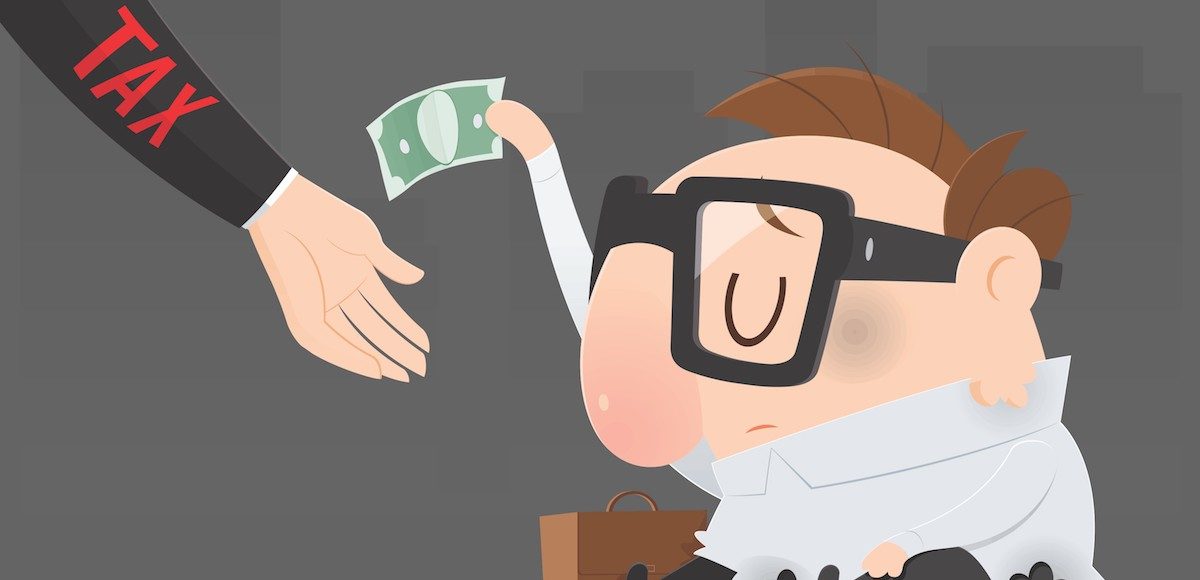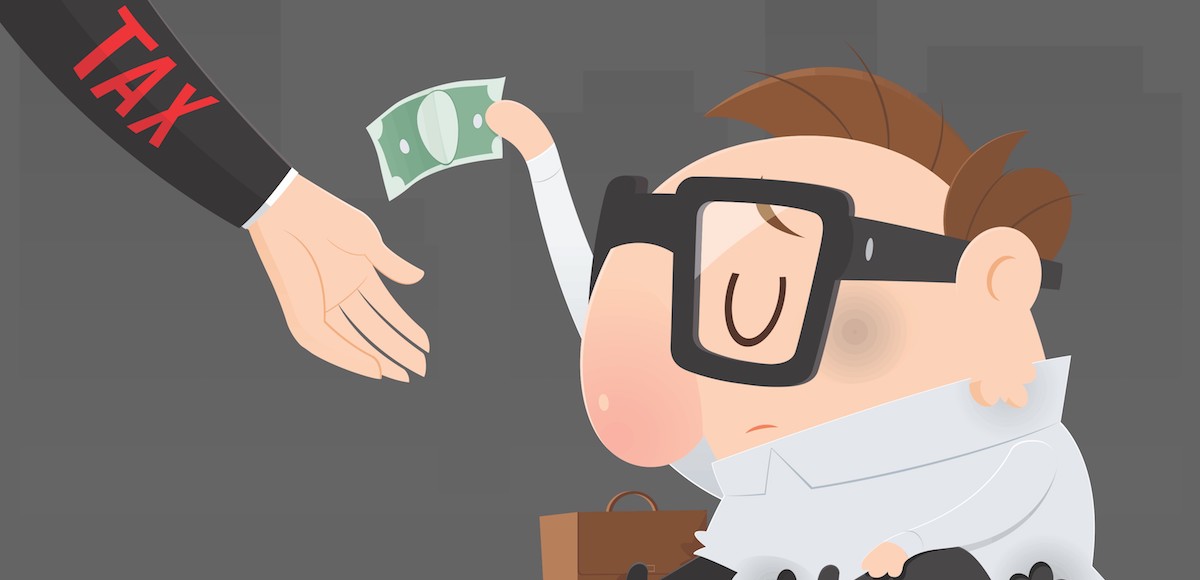

Cartoon workingman reluctantly paying taxes. (Photo: AdobeStock/PPD/Adiano)
My long-running feud with the Paris-based Organization for Economic Cooperation and Development (OECD) could be categorized as a fight over tax compliance.
The bureaucrats at the OECD say that financial privacy must be eviscerated and the fiscal sovereignty must be wiped out so that high-tax governments can track and tax money around the world.
My view is that pro-growth reforms like the flat tax would be a much better approach. With a simple and fair tax code that doesn’t impose extra layers of tax on saving and investment, the IRS no longer would need to know about our bank accounts or investment funds – regardless of whether they are based in Geneva, Illinois, or Geneva, Switzerland.
Though I view better compliance as a secondary benefit. My main goal is to have a tax system that doesn’t impose needlessly high levels of economic damage.
But let’s stick with the compliance issue. Writing for E21, Daniel Di Martino explains that the Italian government makes evasion and avoidance a preferable option because tax rates are too onerous.
Italy’s problem, similar to many of its southern-European neighbors, is an oppressively high tax burden, irresponsible welfare programs that encourage high measured unemployment and increase the debt, and high levels of regulation. …the share of average wages collected by the Italian government via income and social security taxes is among the highest in the OECD at 48 percent. In addition, Italy imposes a value-added tax of 22 percent on most goods and services, one of the highest in Europe. Plus, Italy’s corporate, capital gains, gift, and myriad other taxes are passed on to individuals and borne directly by workers. These high taxes lead to a growing shadow economy, where people underreport work to avoid paying taxes. …many estimates point to more than $175 billion (€150 billion) in lost tax revenue.
So what’s the best way of addressing that nation’s huge shadow economy?
Simple, less government.
Instead of cracking down on tax evasion and the shadow economy, Italy’s new government needs to rethink long-standing policies to bring a real economic recovery. Taxes need to be lowered so more businesses open and already-existing businesses and individuals come out of the shadows, broadening the tax base and raising revenue. This would allow those in the shadow economy to expand their businesses. Additionally, the welfare state should be trimmed so that people do not have an incentive to stay unemployed and young Italians are less burdened by government debt. Moreover, Italy needs to become more competitive by slashing the number of regulations.
The Institut Economique Molinari in Belgium took a look at the same issue, but included data for all European Union nations.
Economic reasoning and international experience point invariably to common causes that consistently create obstacles to dealings in the official economy: prohibitions, compulsory levies and specific tax measures, as well as fastidious and complex regulations. …As noted by two specialists, “In almost all studies, one of the most important causes (…) is the rise of the tax and social security burdens.” The higher these burdens on labour relations and dealings in the official economy, the less profitable these dealings become and the greater the incentive to trade on the black market. …As long as taxes account for a high share of the final price, opportunities for profit are provided in the underground economy, which moves in on a long‐term basis and comes to account for a significant share of countrywide sales. …Increasing this tax burden can only increase the disconnection between the real production cost of goods and their price on the official market, to such a degree that consumers begin abandoning the official market on a larger scale.
So what’s the answer?
Definitely not more government.
Given the scope of the underground economy, public authorities generally suggest toughening the means of repression so as to collect more tax revenues. The justification for this repression remains the same: it would promote the transfer of all under ground activity to the legal market, thereby creating new tax revenues. Beyond the cost of this repression in terms of resources and bureaucratisation of the economy, this reasoning and the resulting forecasts are erroneous. Though certain activities may no longer be undertaken in the underground economy, they will not be undertaken in the official economy either — in part or even in whole, depending on the specific case — because of the burden of compulsory levies and regulations. …Increased repression by the public authorities, without any change in regulatory and tax frameworks, risks simply destroying economic activities and the associated revenues. The only long‐lasting solution for ending the underground economy consists of dealing with the causes that give rise to it and thus to free the official market from its fiscal and regulatory burdens. …there is no other choice but to lighten tax and regulatory burdens.
Let’s now cross to this side of the Atlantic Ocean.
In an editorial about the current and former Treasury Secretary and their Cayman investments, the Wall Street Journal highlighted hypocrisy. But the best part was the conclusion about bad government policy driving money away from America.
Mr. Mnuchin served as director of Dune Capital, an investment firm he said he registered in the Caymans primarily to “accommodate nonprofits and pensions that want to invest through these off-shore entities.” By contrast, Mr. Lew was personally invested in the Citigroup Venture Capital International Growth Partnership II. You know, like that evil profiteer Mitt Romney, the subject of a now infamous Barack Obama campaign ad scoring Mr. Romney for profiting from money in offshore havens such as the Caymans. Mr. Lew’s Cayman company even used the same Ugland House building in the Caymans that President Obama so famously trashed as an “outrage” and “tax scam.” …The Democratic goal…seemed to be to get Mr. Mnuchin to admit that investors go to the Caymans to avoid American taxes. Mr. Mnuchin denied it but needn’t have been so shy. The Caymans have no corporate tax rate. The way to deal with the Caymans is not to punish investors who go there but to get rid of the regulations and high tax rates that send capital offshore.
But it’s not just market-friendly organizations that realize high tax burdens bolster the underground economy.
The International Monetary Fund released a study earlier this year on the shadow economy, which is defined as legal activities that are hidden from government.
The shadow economy includes all economic activities which are hidden from official authorities for monetary, regulatory, and institutional reasons. Monetary reasons include avoiding paying taxes and all social security contributions, regulatory reasons include avoiding governmental bureaucracy or the burden of regulatory framework, while institutional reasons include corruption law, the quality of political institutions and weak rule of law. For our study, the shadow economy reflects mostly legal economic and productive activities that, if recorded, would contribute to national GDP.
And what causes people to hide legal activity from government?
Here are some of the factors that drive the shadow economy according to the IMF.

In other words, people are less likely to comply when they have to endure bad government policy.
…in most cases trade openness, unemployment rate, GDP per capita, size of government, fiscal freedom and control of corruption are highly statistically significant.
And the number one bad government policy is high tax rates.

Let’s close by looking at the other side’s arguments.
Earlier this month, I revealed that the OECD finally admitted that it’s anti-tax competition project was motivated by a desire for class warfare and bigger government.
That’s terrible policy, but I give the bureaucrats in Paris credit for finally being honest.
By contrast, I’m not sure what to say about the bureaucrats in Brussels. The European Commission’s idea of an argument is this vapid video, which attempts to convince viewers that 20 percent of what they like is missing because government isn’t collecting more tax revenue.
In reality, of course, the money isn’t “missing.” It’s still in the private sector, where it actually is providing things that people like, rather than financing the stuff politicians like.






